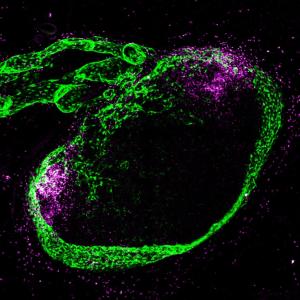Vaccines trigger rapid lymph node responses
Vaccines trigger a notably rapid response in the stromal cells of draining lymph nodes within the first hours after administration.
Our aim was to understand the immunology of the early stages of the vaccine response, and indeed, we discovered completely new aspects of the role of stromal cells.”
TURKU, FINLAND, August 18, 2025 /EINPresswire.com/ -- Vaccines trigger a notably rapid response in the stromal cells of draining lymph nodes within the first hours after administration. Researchers at the University of Turku and the InFLAMES Flagship in Finland also discovered that the stromal alterations prime the lymph node landscape for the subsequent steps of vaccine-induced immune responses.— Professor Marko Salmi
Lymph nodes are a key part of the human immune system, whose primary function is to combat infections. The effectiveness of vaccines is based on their ability to trigger events in lymph nodes that lead to the development of an immune response that protects the host against pathogens.
Researchers from Turku, Finland, observed that lymphatic endothelial cells and other stromal cells are the first cells in the lymph nodes to come into contact with vaccines. The vaccines induced several changes in stromal cells at the gene and protein levels within the first hours after vaccination, which in turn affected lymph node function.
The changes in the stromal cells were observed before the development of the protective immune response triggered by the vaccine. The researchers also discovered that different vaccines activate lymph node stromal cells in different ways.
“The general perception is that specialised white blood cells begin to transport the active ingredients of a vaccine from the muscle to the lymph nodes approximately 12 hours after vaccination. Our new research results show that the vaccine-induced immune response of the lymph nodes begins much earlier, and the white blood cells bearing the antigens, or the active ingredients of the vaccine, actually arrive at an altered tissue environment that has already been primed by the vaccine. This priming supports the development of the immune response,” explains Postdoctoral Researcher of the Research Council of Finland Ruth Fair-Mäkelä, the lead author of the study.
“It was exciting to discover how different the responses induced by different types of vaccines were. One vaccine type, for example, had a direct effect on specific lymphatic endothelial cells. Another type of vaccine triggered a previously unknown phenomenon in which eosinophilic white blood cells accumulated in the draining lymph node,” says Fair-Mäkelä.
Fair-Mäkelä emphasised that even though the research group used COVID-19 vaccines as a model in their study, they did not examine their effectiveness or safety.
“Our aim was to understand the immunology of the early stages of the vaccine response, and indeed, we discovered completely new aspects of the role of stromal cells. In the future, we aim to investigate whether certain changes in stromal cells would be particularly beneficial for achieving the desired vaccine response,” notes Professor and InFLAMES group leader Marko Salmi, who led the study.
The study has been published in the esteemed journal Science Immunology. A total of 13 researchers participated in the study, which was funded by the Research Council of Finland, the InFLAMES Flagship, the Sigrid Jusélius Foundation, the Sakari Alhopuro Foundation, and the Instrumentarium Science Foundation.
InFLAMES Flagship is a joint initiative of the University of Turku and Åbo Akademi University in Turku, Finland. The goal of the Flagship is to integrate immunological and immunology-related research activities to develop and exploit new diagnostic and therapeutic tools for personalised medicine. InFLAMES is part of the Research Council of Finland´s Flagship Programme.
Link to the research article: https://www.science.org/doi/10.1126/sciimmunol.adr6787
The University of Turku is an inspiring and international academic community of 25,000 students and staff in Southwest Finland. We build a sustainable future with multidisciplinary research, education, and collaboration.
> All press releases of the University of Turku
Marko Salmi
University of Turku
+358 29 4504380
email us here
Legal Disclaimer:
EIN Presswire provides this news content "as is" without warranty of any kind. We do not accept any responsibility or liability for the accuracy, content, images, videos, licenses, completeness, legality, or reliability of the information contained in this article. If you have any complaints or copyright issues related to this article, kindly contact the author above.

